Case Study Report: Cross-Cultural Challenges in Business Management
VerifiedAdded on 2023/06/10
|10
|2513
|312
Case Study
AI Summary
This case study report examines the complexities of intercultural management, focusing on a failed joint venture between an American sports equipment manufacturer and a Japanese firm. The report identifies the cultural missteps of the American representatives, highlighting their lack of understanding of Japanese business etiquette and cultural norms. It utilizes Hofstede's cultural dimensions and the Monochronic vs. Polychronic cultures to explain the cultural differences and communication gaps. The analysis further employs the ABC theory and McClelland's theory of needs to dissect the behaviors and motivations of the parties involved. The report concludes with recommendations for the American representatives, emphasizing the importance of respect, cultural sensitivity, and effective communication in international business dealings. The report underscores the critical role of intercultural management in fostering successful global partnerships and avoiding misunderstandings.

Case study report
Paraphrase This Document
Need a fresh take? Get an instant paraphrase of this document with our AI Paraphraser
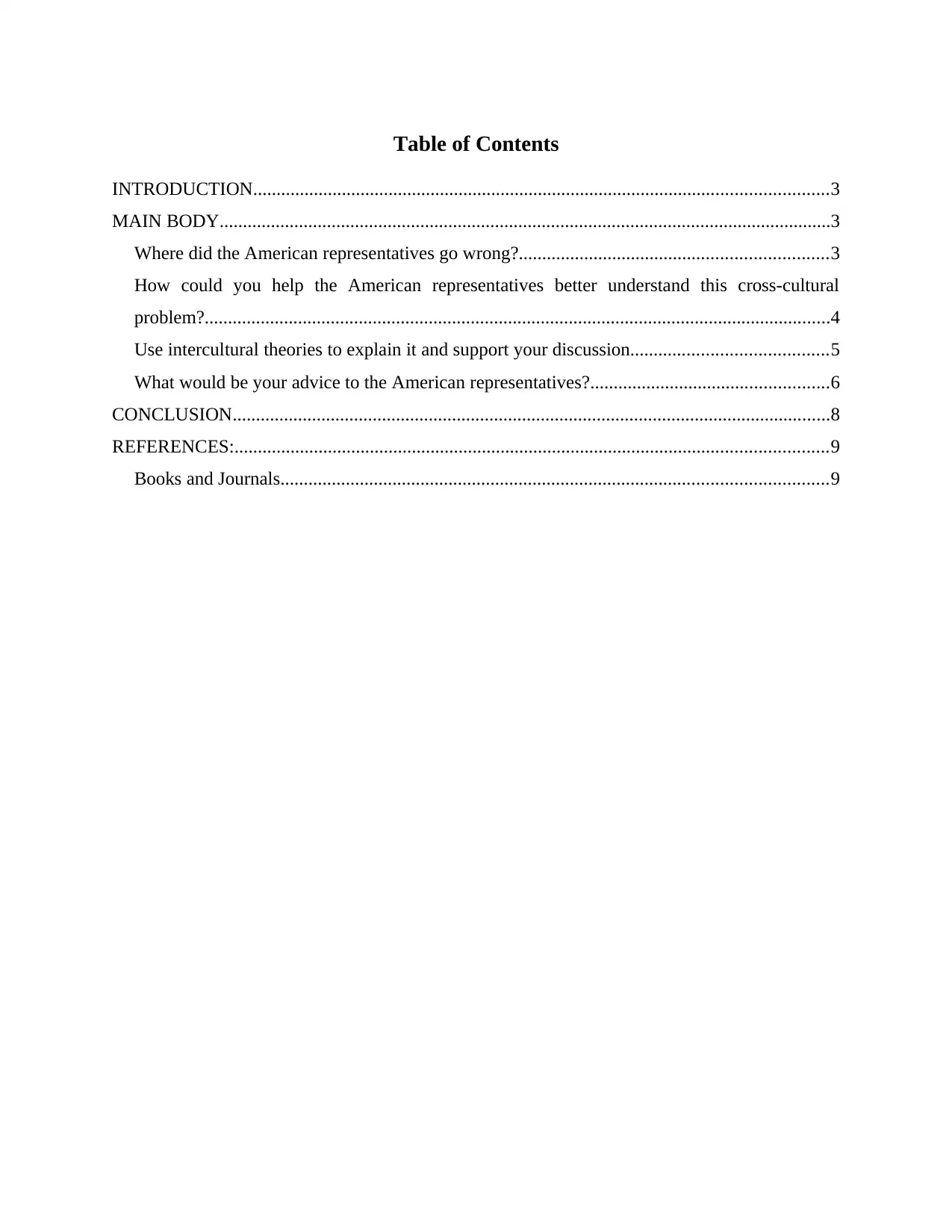
Table of Contents
INTRODUCTION...........................................................................................................................3
MAIN BODY...................................................................................................................................3
Where did the American representatives go wrong?..................................................................3
How could you help the American representatives better understand this cross-cultural
problem?......................................................................................................................................4
Use intercultural theories to explain it and support your discussion..........................................5
What would be your advice to the American representatives?...................................................6
CONCLUSION................................................................................................................................8
REFERENCES:...............................................................................................................................9
Books and Journals.....................................................................................................................9
INTRODUCTION...........................................................................................................................3
MAIN BODY...................................................................................................................................3
Where did the American representatives go wrong?..................................................................3
How could you help the American representatives better understand this cross-cultural
problem?......................................................................................................................................4
Use intercultural theories to explain it and support your discussion..........................................5
What would be your advice to the American representatives?...................................................6
CONCLUSION................................................................................................................................8
REFERENCES:...............................................................................................................................9
Books and Journals.....................................................................................................................9
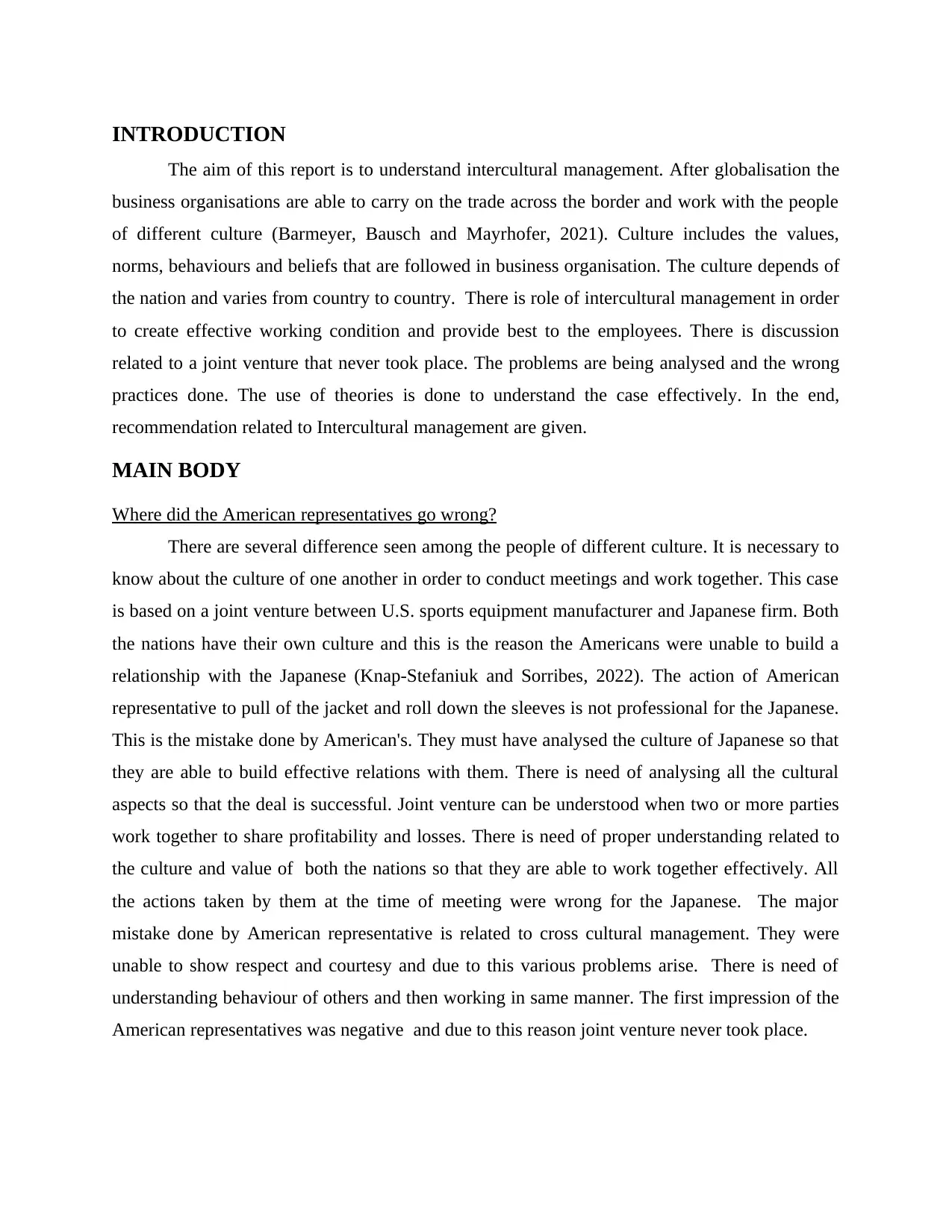
INTRODUCTION
The aim of this report is to understand intercultural management. After globalisation the
business organisations are able to carry on the trade across the border and work with the people
of different culture (Barmeyer, Bausch and Mayrhofer, 2021). Culture includes the values,
norms, behaviours and beliefs that are followed in business organisation. The culture depends of
the nation and varies from country to country. There is role of intercultural management in order
to create effective working condition and provide best to the employees. There is discussion
related to a joint venture that never took place. The problems are being analysed and the wrong
practices done. The use of theories is done to understand the case effectively. In the end,
recommendation related to Intercultural management are given.
MAIN BODY
Where did the American representatives go wrong?
There are several difference seen among the people of different culture. It is necessary to
know about the culture of one another in order to conduct meetings and work together. This case
is based on a joint venture between U.S. sports equipment manufacturer and Japanese firm. Both
the nations have their own culture and this is the reason the Americans were unable to build a
relationship with the Japanese (Knap-Stefaniuk and Sorribes, 2022). The action of American
representative to pull of the jacket and roll down the sleeves is not professional for the Japanese.
This is the mistake done by American's. They must have analysed the culture of Japanese so that
they are able to build effective relations with them. There is need of analysing all the cultural
aspects so that the deal is successful. Joint venture can be understood when two or more parties
work together to share profitability and losses. There is need of proper understanding related to
the culture and value of both the nations so that they are able to work together effectively. All
the actions taken by them at the time of meeting were wrong for the Japanese. The major
mistake done by American representative is related to cross cultural management. They were
unable to show respect and courtesy and due to this various problems arise. There is need of
understanding behaviour of others and then working in same manner. The first impression of the
American representatives was negative and due to this reason joint venture never took place.
The aim of this report is to understand intercultural management. After globalisation the
business organisations are able to carry on the trade across the border and work with the people
of different culture (Barmeyer, Bausch and Mayrhofer, 2021). Culture includes the values,
norms, behaviours and beliefs that are followed in business organisation. The culture depends of
the nation and varies from country to country. There is role of intercultural management in order
to create effective working condition and provide best to the employees. There is discussion
related to a joint venture that never took place. The problems are being analysed and the wrong
practices done. The use of theories is done to understand the case effectively. In the end,
recommendation related to Intercultural management are given.
MAIN BODY
Where did the American representatives go wrong?
There are several difference seen among the people of different culture. It is necessary to
know about the culture of one another in order to conduct meetings and work together. This case
is based on a joint venture between U.S. sports equipment manufacturer and Japanese firm. Both
the nations have their own culture and this is the reason the Americans were unable to build a
relationship with the Japanese (Knap-Stefaniuk and Sorribes, 2022). The action of American
representative to pull of the jacket and roll down the sleeves is not professional for the Japanese.
This is the mistake done by American's. They must have analysed the culture of Japanese so that
they are able to build effective relations with them. There is need of analysing all the cultural
aspects so that the deal is successful. Joint venture can be understood when two or more parties
work together to share profitability and losses. There is need of proper understanding related to
the culture and value of both the nations so that they are able to work together effectively. All
the actions taken by them at the time of meeting were wrong for the Japanese. The major
mistake done by American representative is related to cross cultural management. They were
unable to show respect and courtesy and due to this various problems arise. There is need of
understanding behaviour of others and then working in same manner. The first impression of the
American representatives was negative and due to this reason joint venture never took place.
⊘ This is a preview!⊘
Do you want full access?
Subscribe today to unlock all pages.

Trusted by 1+ million students worldwide
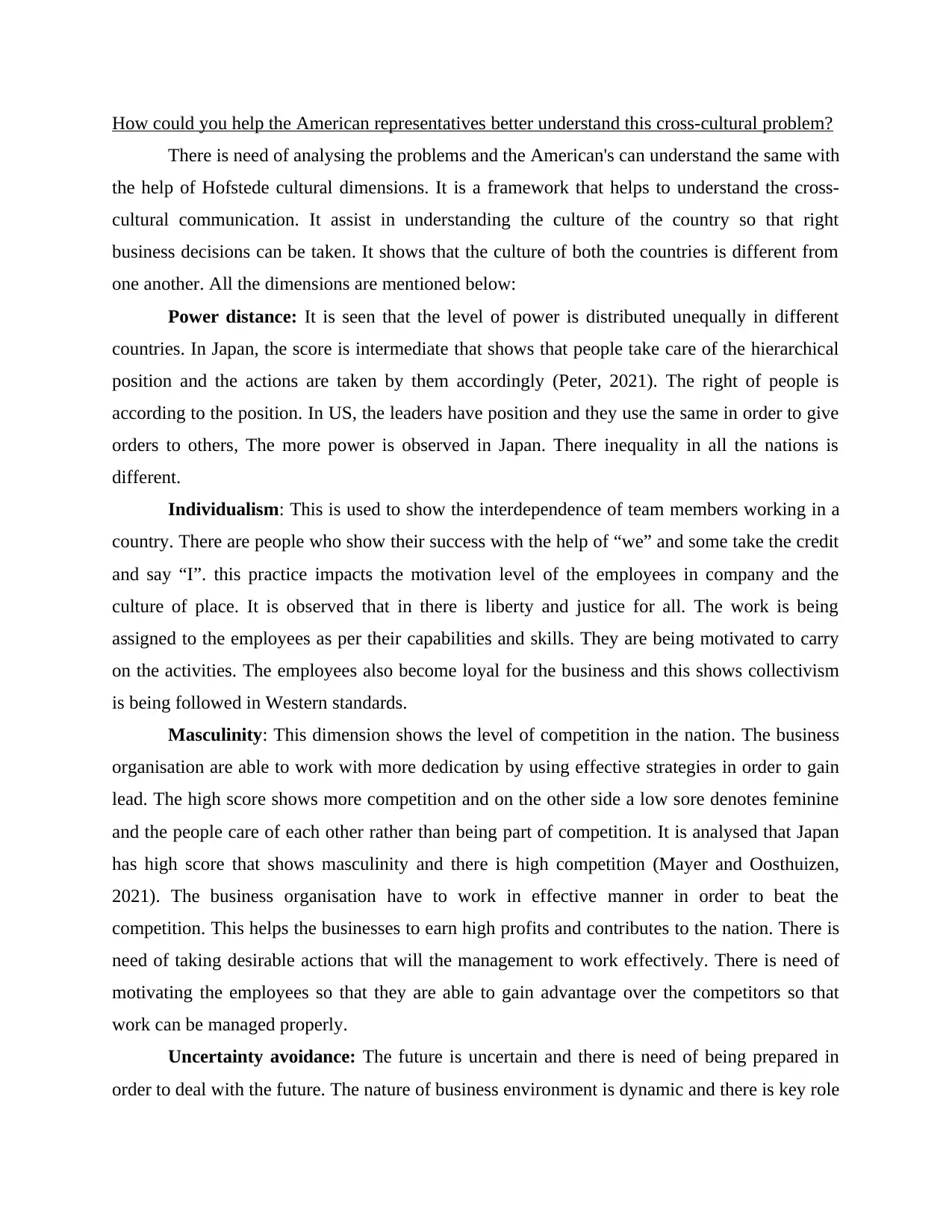
How could you help the American representatives better understand this cross-cultural problem?
There is need of analysing the problems and the American's can understand the same with
the help of Hofstede cultural dimensions. It is a framework that helps to understand the cross-
cultural communication. It assist in understanding the culture of the country so that right
business decisions can be taken. It shows that the culture of both the countries is different from
one another. All the dimensions are mentioned below:
Power distance: It is seen that the level of power is distributed unequally in different
countries. In Japan, the score is intermediate that shows that people take care of the hierarchical
position and the actions are taken by them accordingly (Peter, 2021). The right of people is
according to the position. In US, the leaders have position and they use the same in order to give
orders to others, The more power is observed in Japan. There inequality in all the nations is
different.
Individualism: This is used to show the interdependence of team members working in a
country. There are people who show their success with the help of “we” and some take the credit
and say “I”. this practice impacts the motivation level of the employees in company and the
culture of place. It is observed that in there is liberty and justice for all. The work is being
assigned to the employees as per their capabilities and skills. They are being motivated to carry
on the activities. The employees also become loyal for the business and this shows collectivism
is being followed in Western standards.
Masculinity: This dimension shows the level of competition in the nation. The business
organisation are able to work with more dedication by using effective strategies in order to gain
lead. The high score shows more competition and on the other side a low sore denotes feminine
and the people care of each other rather than being part of competition. It is analysed that Japan
has high score that shows masculinity and there is high competition (Mayer and Oosthuizen,
2021). The business organisation have to work in effective manner in order to beat the
competition. This helps the businesses to earn high profits and contributes to the nation. There is
need of taking desirable actions that will the management to work effectively. There is need of
motivating the employees so that they are able to gain advantage over the competitors so that
work can be managed properly.
Uncertainty avoidance: The future is uncertain and there is need of being prepared in
order to deal with the future. The nature of business environment is dynamic and there is key role
There is need of analysing the problems and the American's can understand the same with
the help of Hofstede cultural dimensions. It is a framework that helps to understand the cross-
cultural communication. It assist in understanding the culture of the country so that right
business decisions can be taken. It shows that the culture of both the countries is different from
one another. All the dimensions are mentioned below:
Power distance: It is seen that the level of power is distributed unequally in different
countries. In Japan, the score is intermediate that shows that people take care of the hierarchical
position and the actions are taken by them accordingly (Peter, 2021). The right of people is
according to the position. In US, the leaders have position and they use the same in order to give
orders to others, The more power is observed in Japan. There inequality in all the nations is
different.
Individualism: This is used to show the interdependence of team members working in a
country. There are people who show their success with the help of “we” and some take the credit
and say “I”. this practice impacts the motivation level of the employees in company and the
culture of place. It is observed that in there is liberty and justice for all. The work is being
assigned to the employees as per their capabilities and skills. They are being motivated to carry
on the activities. The employees also become loyal for the business and this shows collectivism
is being followed in Western standards.
Masculinity: This dimension shows the level of competition in the nation. The business
organisation are able to work with more dedication by using effective strategies in order to gain
lead. The high score shows more competition and on the other side a low sore denotes feminine
and the people care of each other rather than being part of competition. It is analysed that Japan
has high score that shows masculinity and there is high competition (Mayer and Oosthuizen,
2021). The business organisation have to work in effective manner in order to beat the
competition. This helps the businesses to earn high profits and contributes to the nation. There is
need of taking desirable actions that will the management to work effectively. There is need of
motivating the employees so that they are able to gain advantage over the competitors so that
work can be managed properly.
Uncertainty avoidance: The future is uncertain and there is need of being prepared in
order to deal with the future. The nature of business environment is dynamic and there is key role
Paraphrase This Document
Need a fresh take? Get an instant paraphrase of this document with our AI Paraphraser
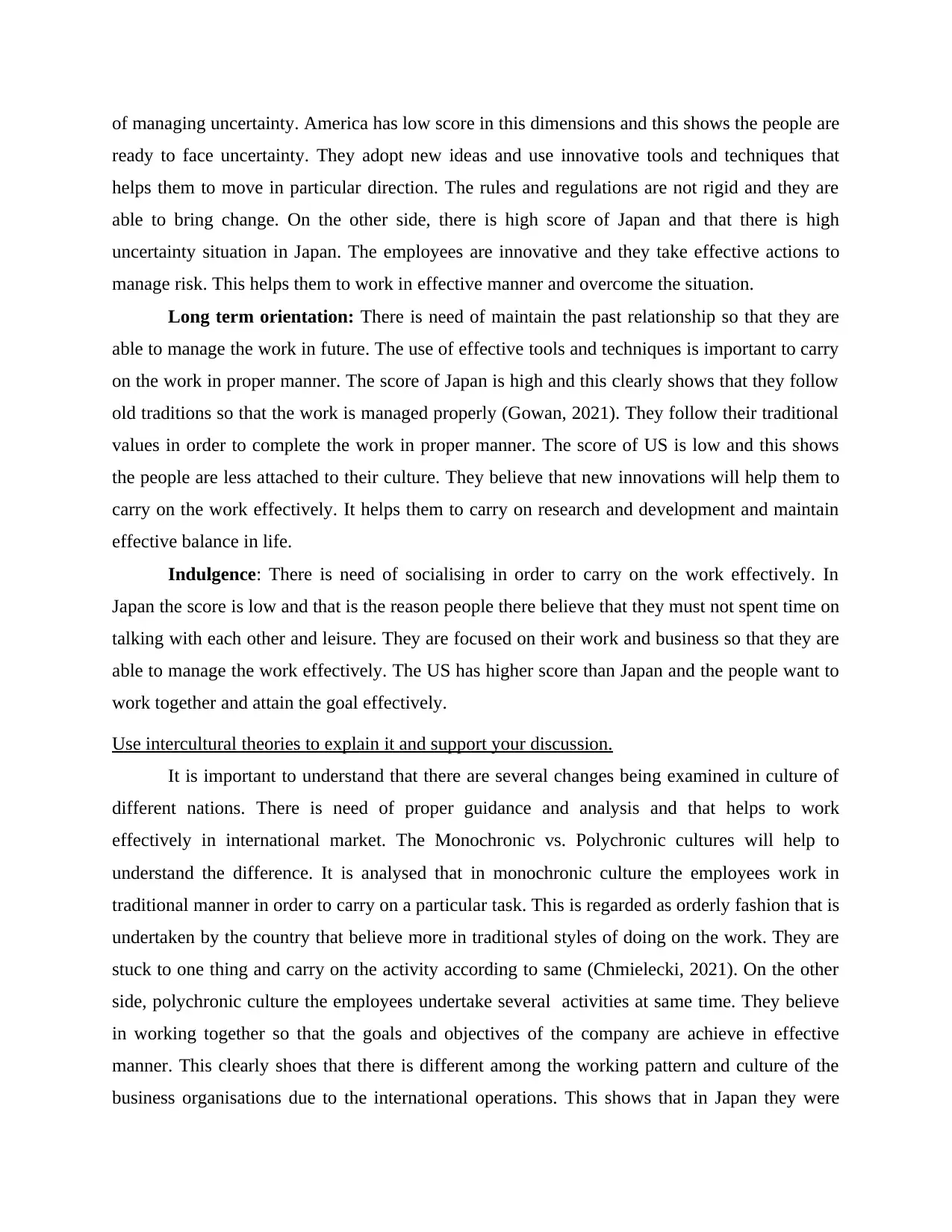
of managing uncertainty. America has low score in this dimensions and this shows the people are
ready to face uncertainty. They adopt new ideas and use innovative tools and techniques that
helps them to move in particular direction. The rules and regulations are not rigid and they are
able to bring change. On the other side, there is high score of Japan and that there is high
uncertainty situation in Japan. The employees are innovative and they take effective actions to
manage risk. This helps them to work in effective manner and overcome the situation.
Long term orientation: There is need of maintain the past relationship so that they are
able to manage the work in future. The use of effective tools and techniques is important to carry
on the work in proper manner. The score of Japan is high and this clearly shows that they follow
old traditions so that the work is managed properly (Gowan, 2021). They follow their traditional
values in order to complete the work in proper manner. The score of US is low and this shows
the people are less attached to their culture. They believe that new innovations will help them to
carry on the work effectively. It helps them to carry on research and development and maintain
effective balance in life.
Indulgence: There is need of socialising in order to carry on the work effectively. In
Japan the score is low and that is the reason people there believe that they must not spent time on
talking with each other and leisure. They are focused on their work and business so that they are
able to manage the work effectively. The US has higher score than Japan and the people want to
work together and attain the goal effectively.
Use intercultural theories to explain it and support your discussion.
It is important to understand that there are several changes being examined in culture of
different nations. There is need of proper guidance and analysis and that helps to work
effectively in international market. The Monochronic vs. Polychronic cultures will help to
understand the difference. It is analysed that in monochronic culture the employees work in
traditional manner in order to carry on a particular task. This is regarded as orderly fashion that is
undertaken by the country that believe more in traditional styles of doing on the work. They are
stuck to one thing and carry on the activity according to same (Chmielecki, 2021). On the other
side, polychronic culture the employees undertake several activities at same time. They believe
in working together so that the goals and objectives of the company are achieve in effective
manner. This clearly shoes that there is different among the working pattern and culture of the
business organisations due to the international operations. This shows that in Japan they were
ready to face uncertainty. They adopt new ideas and use innovative tools and techniques that
helps them to move in particular direction. The rules and regulations are not rigid and they are
able to bring change. On the other side, there is high score of Japan and that there is high
uncertainty situation in Japan. The employees are innovative and they take effective actions to
manage risk. This helps them to work in effective manner and overcome the situation.
Long term orientation: There is need of maintain the past relationship so that they are
able to manage the work in future. The use of effective tools and techniques is important to carry
on the work in proper manner. The score of Japan is high and this clearly shows that they follow
old traditions so that the work is managed properly (Gowan, 2021). They follow their traditional
values in order to complete the work in proper manner. The score of US is low and this shows
the people are less attached to their culture. They believe that new innovations will help them to
carry on the work effectively. It helps them to carry on research and development and maintain
effective balance in life.
Indulgence: There is need of socialising in order to carry on the work effectively. In
Japan the score is low and that is the reason people there believe that they must not spent time on
talking with each other and leisure. They are focused on their work and business so that they are
able to manage the work effectively. The US has higher score than Japan and the people want to
work together and attain the goal effectively.
Use intercultural theories to explain it and support your discussion.
It is important to understand that there are several changes being examined in culture of
different nations. There is need of proper guidance and analysis and that helps to work
effectively in international market. The Monochronic vs. Polychronic cultures will help to
understand the difference. It is analysed that in monochronic culture the employees work in
traditional manner in order to carry on a particular task. This is regarded as orderly fashion that is
undertaken by the country that believe more in traditional styles of doing on the work. They are
stuck to one thing and carry on the activity according to same (Chmielecki, 2021). On the other
side, polychronic culture the employees undertake several activities at same time. They believe
in working together so that the goals and objectives of the company are achieve in effective
manner. This clearly shoes that there is different among the working pattern and culture of the
business organisations due to the international operations. This shows that in Japan they were
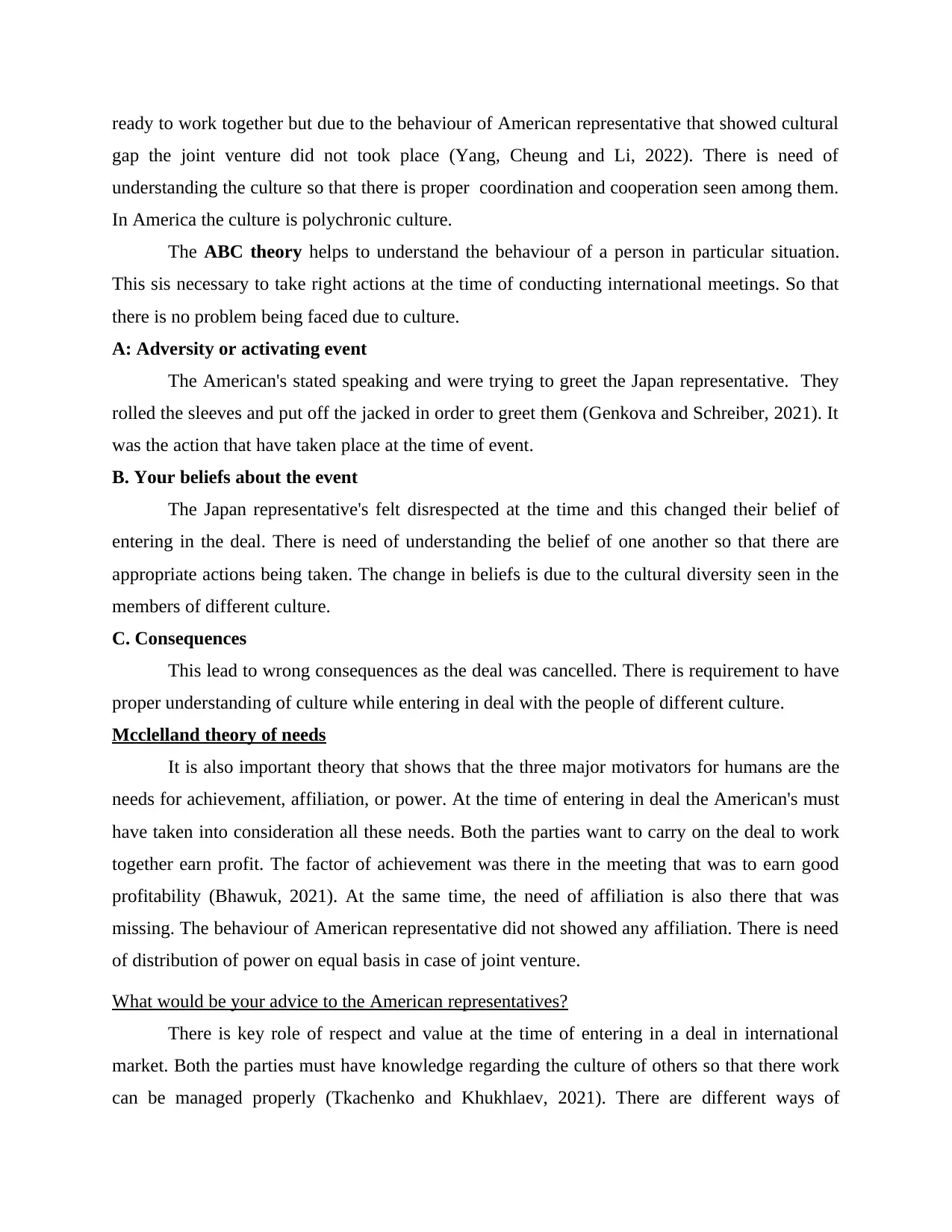
ready to work together but due to the behaviour of American representative that showed cultural
gap the joint venture did not took place (Yang, Cheung and Li, 2022). There is need of
understanding the culture so that there is proper coordination and cooperation seen among them.
In America the culture is polychronic culture.
The ABC theory helps to understand the behaviour of a person in particular situation.
This sis necessary to take right actions at the time of conducting international meetings. So that
there is no problem being faced due to culture.
A: Adversity or activating event
The American's stated speaking and were trying to greet the Japan representative. They
rolled the sleeves and put off the jacked in order to greet them (Genkova and Schreiber, 2021). It
was the action that have taken place at the time of event.
B. Your beliefs about the event
The Japan representative's felt disrespected at the time and this changed their belief of
entering in the deal. There is need of understanding the belief of one another so that there are
appropriate actions being taken. The change in beliefs is due to the cultural diversity seen in the
members of different culture.
C. Consequences
This lead to wrong consequences as the deal was cancelled. There is requirement to have
proper understanding of culture while entering in deal with the people of different culture.
Mcclelland theory of needs
It is also important theory that shows that the three major motivators for humans are the
needs for achievement, affiliation, or power. At the time of entering in deal the American's must
have taken into consideration all these needs. Both the parties want to carry on the deal to work
together earn profit. The factor of achievement was there in the meeting that was to earn good
profitability (Bhawuk, 2021). At the same time, the need of affiliation is also there that was
missing. The behaviour of American representative did not showed any affiliation. There is need
of distribution of power on equal basis in case of joint venture.
What would be your advice to the American representatives?
There is key role of respect and value at the time of entering in a deal in international
market. Both the parties must have knowledge regarding the culture of others so that there work
can be managed properly (Tkachenko and Khukhlaev, 2021). There are different ways of
gap the joint venture did not took place (Yang, Cheung and Li, 2022). There is need of
understanding the culture so that there is proper coordination and cooperation seen among them.
In America the culture is polychronic culture.
The ABC theory helps to understand the behaviour of a person in particular situation.
This sis necessary to take right actions at the time of conducting international meetings. So that
there is no problem being faced due to culture.
A: Adversity or activating event
The American's stated speaking and were trying to greet the Japan representative. They
rolled the sleeves and put off the jacked in order to greet them (Genkova and Schreiber, 2021). It
was the action that have taken place at the time of event.
B. Your beliefs about the event
The Japan representative's felt disrespected at the time and this changed their belief of
entering in the deal. There is need of understanding the belief of one another so that there are
appropriate actions being taken. The change in beliefs is due to the cultural diversity seen in the
members of different culture.
C. Consequences
This lead to wrong consequences as the deal was cancelled. There is requirement to have
proper understanding of culture while entering in deal with the people of different culture.
Mcclelland theory of needs
It is also important theory that shows that the three major motivators for humans are the
needs for achievement, affiliation, or power. At the time of entering in deal the American's must
have taken into consideration all these needs. Both the parties want to carry on the deal to work
together earn profit. The factor of achievement was there in the meeting that was to earn good
profitability (Bhawuk, 2021). At the same time, the need of affiliation is also there that was
missing. The behaviour of American representative did not showed any affiliation. There is need
of distribution of power on equal basis in case of joint venture.
What would be your advice to the American representatives?
There is key role of respect and value at the time of entering in a deal in international
market. Both the parties must have knowledge regarding the culture of others so that there work
can be managed properly (Tkachenko and Khukhlaev, 2021). There are different ways of
⊘ This is a preview!⊘
Do you want full access?
Subscribe today to unlock all pages.

Trusted by 1+ million students worldwide
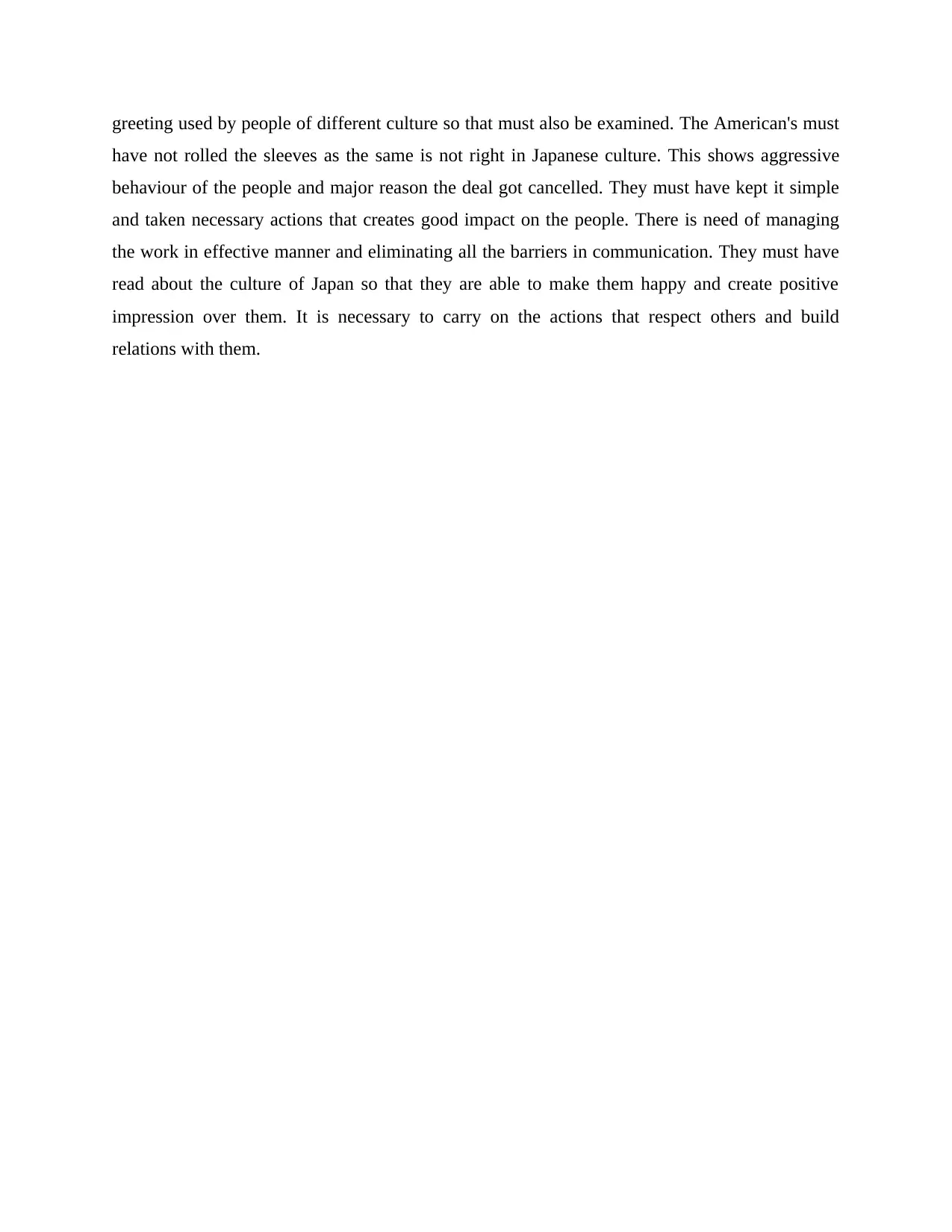
greeting used by people of different culture so that must also be examined. The American's must
have not rolled the sleeves as the same is not right in Japanese culture. This shows aggressive
behaviour of the people and major reason the deal got cancelled. They must have kept it simple
and taken necessary actions that creates good impact on the people. There is need of managing
the work in effective manner and eliminating all the barriers in communication. They must have
read about the culture of Japan so that they are able to make them happy and create positive
impression over them. It is necessary to carry on the actions that respect others and build
relations with them.
have not rolled the sleeves as the same is not right in Japanese culture. This shows aggressive
behaviour of the people and major reason the deal got cancelled. They must have kept it simple
and taken necessary actions that creates good impact on the people. There is need of managing
the work in effective manner and eliminating all the barriers in communication. They must have
read about the culture of Japan so that they are able to make them happy and create positive
impression over them. It is necessary to carry on the actions that respect others and build
relations with them.
Paraphrase This Document
Need a fresh take? Get an instant paraphrase of this document with our AI Paraphraser
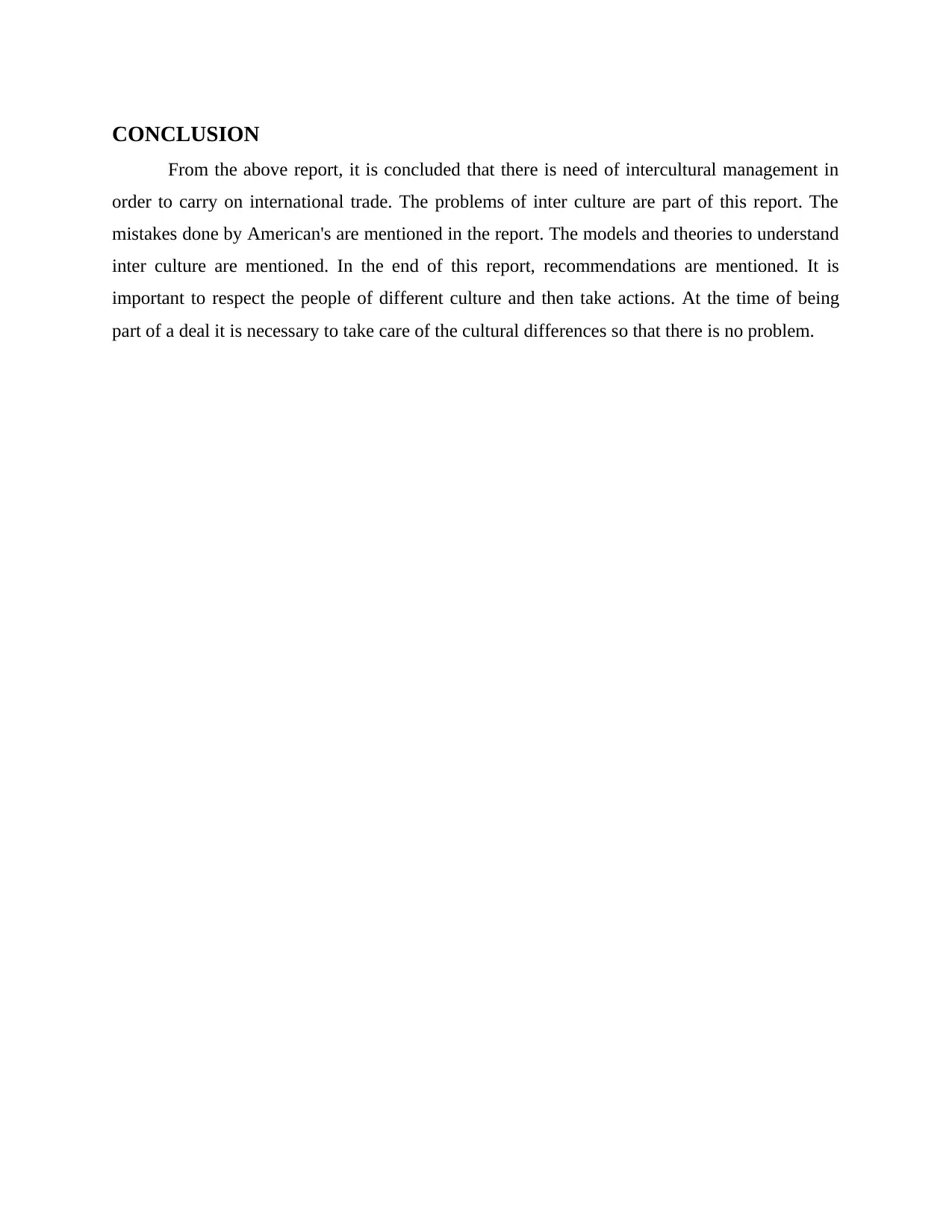
CONCLUSION
From the above report, it is concluded that there is need of intercultural management in
order to carry on international trade. The problems of inter culture are part of this report. The
mistakes done by American's are mentioned in the report. The models and theories to understand
inter culture are mentioned. In the end of this report, recommendations are mentioned. It is
important to respect the people of different culture and then take actions. At the time of being
part of a deal it is necessary to take care of the cultural differences so that there is no problem.
From the above report, it is concluded that there is need of intercultural management in
order to carry on international trade. The problems of inter culture are part of this report. The
mistakes done by American's are mentioned in the report. The models and theories to understand
inter culture are mentioned. In the end of this report, recommendations are mentioned. It is
important to respect the people of different culture and then take actions. At the time of being
part of a deal it is necessary to take care of the cultural differences so that there is no problem.
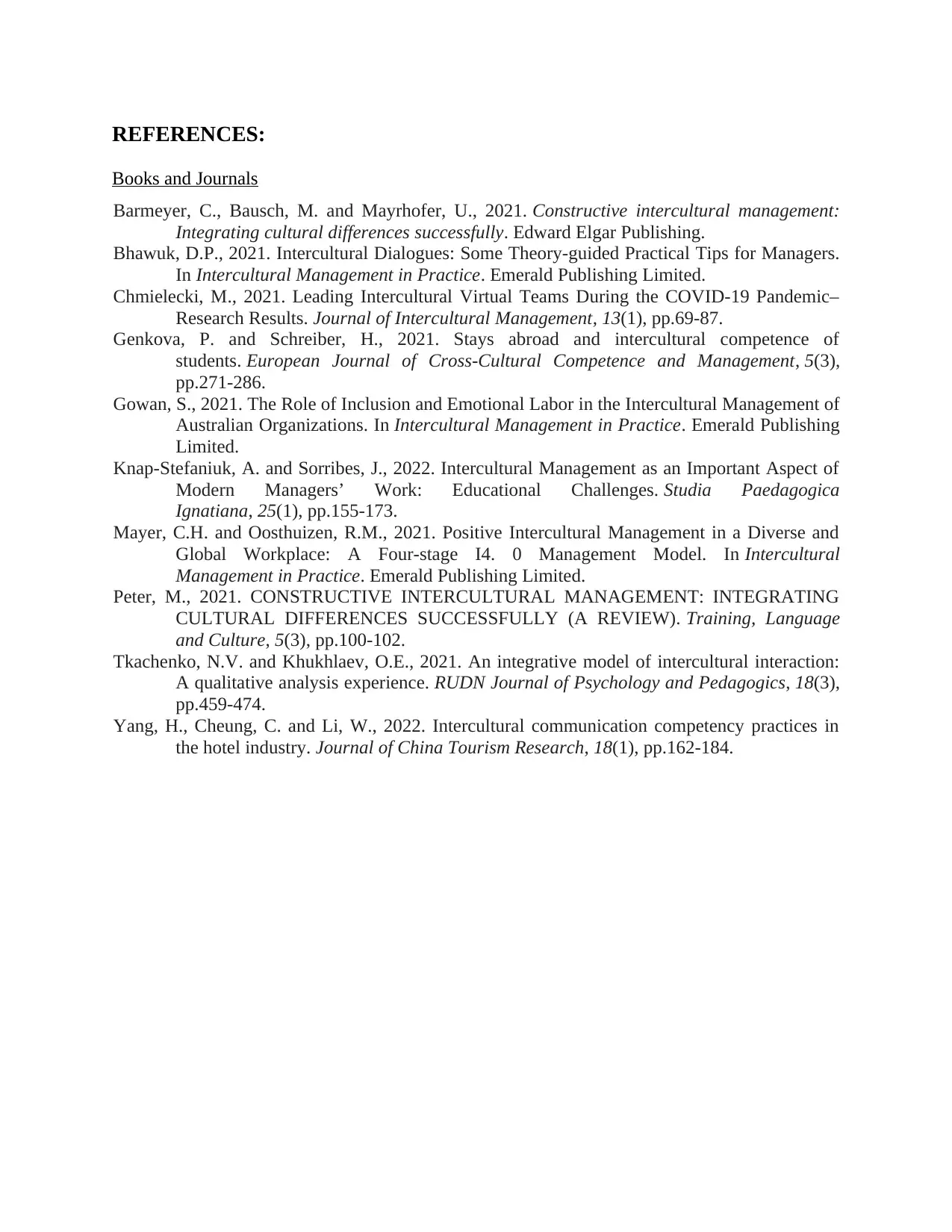
REFERENCES:
Books and Journals
Barmeyer, C., Bausch, M. and Mayrhofer, U., 2021. Constructive intercultural management:
Integrating cultural differences successfully. Edward Elgar Publishing.
Bhawuk, D.P., 2021. Intercultural Dialogues: Some Theory-guided Practical Tips for Managers.
In Intercultural Management in Practice. Emerald Publishing Limited.
Chmielecki, M., 2021. Leading Intercultural Virtual Teams During the COVID-19 Pandemic–
Research Results. Journal of Intercultural Management, 13(1), pp.69-87.
Genkova, P. and Schreiber, H., 2021. Stays abroad and intercultural competence of
students. European Journal of Cross-Cultural Competence and Management, 5(3),
pp.271-286.
Gowan, S., 2021. The Role of Inclusion and Emotional Labor in the Intercultural Management of
Australian Organizations. In Intercultural Management in Practice. Emerald Publishing
Limited.
Knap-Stefaniuk, A. and Sorribes, J., 2022. Intercultural Management as an Important Aspect of
Modern Managers’ Work: Educational Challenges. Studia Paedagogica
Ignatiana, 25(1), pp.155-173.
Mayer, C.H. and Oosthuizen, R.M., 2021. Positive Intercultural Management in a Diverse and
Global Workplace: A Four-stage I4. 0 Management Model. In Intercultural
Management in Practice. Emerald Publishing Limited.
Peter, M., 2021. CONSTRUCTIVE INTERCULTURAL MANAGEMENT: INTEGRATING
CULTURAL DIFFERENCES SUCCESSFULLY (A REVIEW). Training, Language
and Culture, 5(3), pp.100-102.
Tkachenko, N.V. and Khukhlaev, O.E., 2021. An integrative model of intercultural interaction:
A qualitative analysis experience. RUDN Journal of Psychology and Pedagogics, 18(3),
pp.459-474.
Yang, H., Cheung, C. and Li, W., 2022. Intercultural communication competency practices in
the hotel industry. Journal of China Tourism Research, 18(1), pp.162-184.
Books and Journals
Barmeyer, C., Bausch, M. and Mayrhofer, U., 2021. Constructive intercultural management:
Integrating cultural differences successfully. Edward Elgar Publishing.
Bhawuk, D.P., 2021. Intercultural Dialogues: Some Theory-guided Practical Tips for Managers.
In Intercultural Management in Practice. Emerald Publishing Limited.
Chmielecki, M., 2021. Leading Intercultural Virtual Teams During the COVID-19 Pandemic–
Research Results. Journal of Intercultural Management, 13(1), pp.69-87.
Genkova, P. and Schreiber, H., 2021. Stays abroad and intercultural competence of
students. European Journal of Cross-Cultural Competence and Management, 5(3),
pp.271-286.
Gowan, S., 2021. The Role of Inclusion and Emotional Labor in the Intercultural Management of
Australian Organizations. In Intercultural Management in Practice. Emerald Publishing
Limited.
Knap-Stefaniuk, A. and Sorribes, J., 2022. Intercultural Management as an Important Aspect of
Modern Managers’ Work: Educational Challenges. Studia Paedagogica
Ignatiana, 25(1), pp.155-173.
Mayer, C.H. and Oosthuizen, R.M., 2021. Positive Intercultural Management in a Diverse and
Global Workplace: A Four-stage I4. 0 Management Model. In Intercultural
Management in Practice. Emerald Publishing Limited.
Peter, M., 2021. CONSTRUCTIVE INTERCULTURAL MANAGEMENT: INTEGRATING
CULTURAL DIFFERENCES SUCCESSFULLY (A REVIEW). Training, Language
and Culture, 5(3), pp.100-102.
Tkachenko, N.V. and Khukhlaev, O.E., 2021. An integrative model of intercultural interaction:
A qualitative analysis experience. RUDN Journal of Psychology and Pedagogics, 18(3),
pp.459-474.
Yang, H., Cheung, C. and Li, W., 2022. Intercultural communication competency practices in
the hotel industry. Journal of China Tourism Research, 18(1), pp.162-184.
⊘ This is a preview!⊘
Do you want full access?
Subscribe today to unlock all pages.

Trusted by 1+ million students worldwide

1 out of 10
Related Documents
Your All-in-One AI-Powered Toolkit for Academic Success.
+13062052269
info@desklib.com
Available 24*7 on WhatsApp / Email
![[object Object]](/_next/static/media/star-bottom.7253800d.svg)
Unlock your academic potential
Copyright © 2020–2026 A2Z Services. All Rights Reserved. Developed and managed by ZUCOL.

